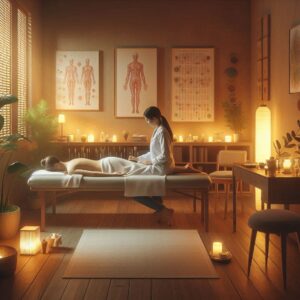Unlock the Healing Power of Acupuncture to Combat Insomnia Effectively
Insomnia is a prevalent sleep disorder that can profoundly disrupt your daily life, making it challenging to fall asleep, remain asleep, or achieve the deep, restorative rest your body craves. This condition varies in duration, ranging from temporary disturbances lasting a few nights to chronic insomnia that can linger for months or even years. Various triggers can contribute to insomnia, including pervasive stress, persistent worry, underlying depression, irregular sleep schedules, certain medications that disrupt sleep, overconsumption of caffeine, and numerous medical conditions. By identifying these potential triggers, you can develop effective treatment strategies that not only restore healthy sleep patterns but also elevate your overall well-being and enhance your quality of life.
Struggling with persistent sleep deprivation can lead to serious repercussions for both your physical and emotional health. Chronic sleep deprivation may compromise the immune system, heightening the risk of severe health issues such as cardiovascular diseases, increasing vulnerability to conditions like diabetes, contributing to obesity, and impairing cognitive functions. On an emotional level, the effects can present as heightened anxiety, deepening depression, mood fluctuations, and irritability, all of which can significantly affect mental health. Deficits in attention, memory, and decision-making abilities can further complicate the challenges associated with chronic insomnia. Therefore, recognizing and addressing the root causes of insomnia is essential for alleviating these adverse health impacts and reclaiming a sense of well-being and vitality.
Essential Insights into Insomnia and Its Significant Health Impacts
- Insomnia is a complex sleep disorder characterized by difficulties in initiating sleep, maintaining sleep, or waking up too early, which negatively impacts overall health and productivity.
- This condition can result from a variety of sources, including stress, anxiety, depression, inadequate sleep hygiene, and certain medications, all of which can disrupt normal sleep patterns.
- Long-term sleep deprivation can severely undermine your health, leading to a weakened immune system, increased risk of chronic disorders, diminished cognitive function, and emotional instability.
- Acupuncture enhances sleep quality by stimulating specific acupoints, aiding in balancing the body’s energy flow and inducing a state of relaxation.
- Numerous scientific studies support the idea that acupuncture can significantly improve sleep quality and alleviate various symptoms associated with insomnia.
- This ancient practice effectively addresses insomnia by reducing anxiety, fostering relaxation, and restoring balance to the body's energy systems.
- Research suggests that acupuncture may enhance melatonin production, help regulate the circadian rhythm, and contribute to overall improved sleep quality.
- Common acupoints employed in insomnia treatment include Shenmen, Sishencong, Anmian, and Yin Tang, each recognized for its therapeutic benefits.
- Experienced practitioners utilize fine needles to stimulate targeted points, promoting tranquility, reducing stress, and improving sleep quality.
- Acupoints like Shenmen are celebrated for their calming effects, while Anmian is notably effective in quieting the mind and enhancing sleep.
- Traditional Chinese medicine underscores the importance of maintaining balanced energy flow and harmony between yin and yang to facilitate quality sleep.
- Integrating herbal remedies such as chamomile, valerian root, and lavender, along with dietary suggestions for warm, easily digestible foods, can significantly enhance sleep quality.
- Employing traditional Chinese medicine techniques, including acupressure, herbal therapies, and Qi Gong, can complement acupuncture in managing insomnia.
- During an acupuncture session for insomnia, practitioners conduct a thorough consultation to assess your sleep habits, lifestyle choices, and overall health status.
- The insertion of fine needles into specific acupoints is designed to promote relaxation, alleviate stress, and enhance overall sleep quality.
- Multiple treatment sessions over several weeks or months may be necessary to achieve optimal results in effectively managing insomnia.
- Creating a sleep-friendly environment is crucial; reducing noise and light disturbances, maintaining a comfortable room temperature, and incorporating relaxation techniques like meditation or deep breathing can significantly enhance sleep quality.
- Establishing a regular sleep schedule, avoiding caffeine and screen exposure before bedtime, and engaging in consistent physical activity can dramatically improve sleep quality.
- Utilizing stress management techniques such as yoga, meditation, or tai chi can further enhance the effectiveness of your insomnia treatment.
- Collaborating with healthcare professionals, including psychologists, nutritionists, or sleep specialists, can successfully integrate acupuncture with other approaches to managing insomnia.
- Complementary therapies such as yoga, meditation, or massage can promote relaxation, alleviate stress, and improve sleep quality.
- Addressing underlying health issues such as anxiety, depression, or chronic pain is vital for comprehensive relief from insomnia.
 Discover How Acupuncture Enhances Sleep Quality
Discover How Acupuncture Enhances Sleep Quality
Acupuncture has been recognized for centuries as a foundational element of traditional Chinese medicine (TCM), praised for its calming effects and ability to promote restorative sleep. This holistic methodology focuses on regulating the body's energy flow, or qi, by activating specific acupoints. By positively influencing the nervous system, reducing stress and anxiety levels, and correcting internal imbalances that contribute to insomnia, acupuncture can dramatically enhance sleep quality. This ancient practice not only helps decrease the frequency of nighttime awakenings but also fosters a profound sense of relaxation and well-being, thereby maximizing the restorative powers of sleep.
A substantial body of scientific research and clinical studies has consistently highlighted the positive effects of acupuncture on sleep quality. For example, a notable study published in The Journal of Alternative and Complementary Medicine found that participants suffering from insomnia exhibited significant improvements in their sleep quality after undergoing acupuncture treatment. Additionally, research published in the Journal of Sleep Research confirmed that acupuncture effectively reduced the severity of insomnia while enhancing overall sleep quality. These compelling findings underscore acupuncture's potential as a safe, natural therapeutic option for individuals grappling with sleep disturbances.
Identifying Key Acupuncture Points to Improve Sleep Quality
Expert acupuncturists strategically target specific acupoints to combat insomnia effectively and enhance sleep quality. These acupoints are pivotal in addressing sleep-related challenges. For instance, the Shenmen point, located on the wrist, is renowned for its calming effects on both the mind and body. Another vital point, Sanyinjiao, situated on the lower thigh, is believed to nourish blood and yin, resulting in reduced anxiety and increased relaxation. The Anmian point, located behind the ear, is often utilized to alleviate insomnia and promote a peaceful night’s rest. The Yintang point, found between the eyebrows, is celebrated for its soothing effects on mental clarity and tranquility.
During acupuncture sessions, practitioners skillfully insert small needles into the skin at precise depths to effectively stimulate these specific points. This stimulation is thought to help regulate the body's energy flow, fostering a sense of balance and harmony within. Consequently, many individuals report a notable reduction in insomnia symptoms and a significant enhancement in sleep quality following treatment.
Exploring the Holistic Principles of Traditional Chinese Medicine for Sleep Improvement
Traditional Chinese medicine (TCM) embraces a holistic perspective on health and wellness, recognizing the intricate connections between the body’s systems and the necessity of balance for optimal health. TCM principles related to sleep highlight the importance of restoring internal harmony to facilitate restful slumber. Herbal remedies are often prescribed to address imbalances that lead to sleep disturbances. Herbs such as valerian root, chamomile, lavender, and passionflower are celebrated for their soothing properties, assisting in achieving deeper, more restorative sleep. These natural solutions are believed to promote physical relaxation and enhance overall sleep quality.
In their practice, TCM practitioners frequently provide dietary recommendations designed to support and improve sleep quality. Individuals experiencing insomnia are often advised to consume foods that nourish the blood and yin. This may include dark leafy greens, nuts, seeds, and seafood, all of which contribute to overall health. Furthermore, practices such as Qigong, tai chi, and acupressure, along with other TCM therapies, can effectively alleviate insomnia by fostering relaxation, reducing stress, and enhancing overall well-being, ultimately leading to improved sleep quality.
 What to Expect During Your First Acupuncture Session for Insomnia Relief
What to Expect During Your First Acupuncture Session for Insomnia Relief
When you arrive for your initial acupuncture session specifically designed to alleviate insomnia, the acupuncturist will conduct a comprehensive evaluation of your sleep patterns, overall health, and any underlying factors that may be contributing to your sleeplessness. Utilizing their expertise, the acupuncturist will develop a personalized treatment plan tailored to your unique needs and circumstances, ensuring a focused approach to your insomnia.
The acupuncture treatment process involves the gentle insertion of fine needles into designated points on your body. Patients are usually encouraged to relax for 20 to 30 minutes while the needles remain in place. During this time, individuals may experience a gentle tingling sensation or mild discomfort; however, the overall experience is frequently described as calming and soothing, creating an optimal environment for sleep.
The timing and frequency of acupuncture sessions may vary based on the severity of insomnia and individual responses to treatment. While some patients notice improvements in their sleep quality after just a few sessions, others may require ongoing treatment to achieve more lasting benefits.
Adopting Positive Lifestyle Changes to Maximize Acupuncture's Effectiveness for Insomnia
In addition to acupuncture, incorporating specific lifestyle modifications can significantly enhance your sleep quality. Creating a sleep-conducive environment is vital for optimizing your overall sleep experience. This includes ensuring that your bedroom is dark, quiet, and calm, utilizing comfortable bedding and pillows, and establishing a soothing bedtime routine that signals to your body that it's time to wind down for the night.
Embracing healthy habits can profoundly improve sleep quality. This includes maintaining a consistent sleep schedule, avoiding caffeine and electronic devices in the hours leading up to bedtime, integrating regular physical activity into your daily routine, and practicing relaxation techniques like deep breathing or meditation to calm the mind and prepare for rest.
Effective stress management techniques can significantly improve the outcomes of acupuncture treatment for insomnia. Engaging in activities such as yoga, meditation, or massage therapy can help alleviate anxiety and encourage relaxation. These practices provide essential support to help you unwind, making it easier to both fall asleep and maintain sleep throughout the night.
 Integrating Acupuncture with Other Effective Strategies for Comprehensive Insomnia Relief
Integrating Acupuncture with Other Effective Strategies for Comprehensive Insomnia Relief
With the guidance of a skilled practitioner, acupuncture can become a vital component of a comprehensive approach to managing insomnia, offering essential relief for those dealing with sleep disorders. Collaborating with other healthcare professionals, such as primary care physicians or mental health specialists, is crucial for delivering holistic care to individuals experiencing insomnia.
By combining acupuncture with complementary practices like yoga, meditation, and massage therapy, individuals can craft a well-rounded strategy to promote relaxation and alleviate stress, leading to improved sleep quality. These methods can be seamlessly integrated into a personalized treatment plan designed to meet each individual's unique needs, ensuring they feel supported and understood throughout their wellness journey.
Additionally, it is essential to address any underlying health issues that may worsen insomnia. Treating chronic pain, anxiety, depression, or other medical conditions that interfere with sleep quality can be integral to the overall treatment process. Those who adopt a holistic perspective on their health and well-being can significantly improve both their sleep quality and overall quality of life.
Ultimately, insomnia can deeply affect both physical and emotional well-being, underscoring the importance of exploring effective treatment options. A knowledgeable practitioner can utilize acupuncture to enhance sleep quality by addressing imbalances within the body and promoting a sense of tranquility. By integrating lifestyle modifications, principles of traditional Chinese medicine, and other complementary therapies, acupuncture can significantly enhance both sleep quality and overall well-being. This holistic approach offers renewed hope and optimism for individuals seeking relief from insomnia.
 Frequently Asked Questions About Acupuncture and Its Role in Insomnia Relief
Frequently Asked Questions About Acupuncture and Its Role in Insomnia Relief
Understanding Acupuncture: What Is It and How Does It Help?
Acupuncture is a time-honored practice rooted in traditional Chinese medicine, where skilled practitioners insert thin needles into specific points on the body. This technique promotes the flow of energy and enhances the body’s natural healing processes, aiding in the relief of various health issues, including insomnia.
Defining Insomnia: What Does It Mean in Medical Terms?
Insomnia is characterized as a sleep disorder that disrupts the ability to fall asleep, maintain sleep, or achieve restorative sleep. This persistent condition often results in daytime fatigue and diminished functionality, making it crucial to pursue effective treatment solutions.
How Does Acupuncture Help Alleviate Symptoms of Insomnia?
Acupuncture has been shown to positively influence insomnia by restoring balance to the body’s nervous system, alleviating stress and anxiety, and inducing a state of relaxation. This approach ultimately enhances both the quality and duration of sleep, establishing acupuncture as an effective treatment alternative.
Is There Scientific Evidence Supporting Acupuncture's Effectiveness for Insomnia Relief?
A variety of studies suggest that acupuncture can improve sleep quality and reduce insomnia symptoms. While evidence supports its benefits, further research is needed to solidify these findings and draw more definitive conclusions regarding its effectiveness.
What Can I Expect During an Acupuncture Session Focused on Insomnia?
During an acupuncture session, a skilled practitioner carefully inserts slender needles into specific points on your body associated with promoting sleep and relaxation. The needles are typically left in place for 15 to 30 minutes while you unwind and embrace a state of tranquility.
Are There Any Potential Side Effects Associated with Acupuncture for Insomnia Treatment?
When performed by a trained and experienced practitioner, acupuncture is generally considered safe. However, some individuals may experience minor side effects such as tenderness, discoloration, or slight bleeding at the sites where needles are inserted.
Can Acupuncture Be a Standalone Treatment for Insomnia?
Acupuncture can be an effective treatment for insomnia when integrated with complementary strategies such as lifestyle modifications, relaxation techniques, and cognitive behavioral therapy for insomnia (CBT-I), creating a comprehensive treatment plan tailored to individual needs.
How Many Acupuncture Sessions Are Typically Needed to Observe Improvements in Insomnia?
The number of acupuncture sessions required to see improvements in insomnia varies based on individual circumstances and the severity of symptoms. Many individuals report enhancements after just a few sessions, while others may require ongoing treatment for sustained benefits.
Provided By:
Cited References for Further Reading
If You Only Get 3 Hours of Sleep One Night – What Happens – Themes Quality. https://www.themesquality.com/what-happens-if-you-only-get-3-hours-of-sleep-for-one-night/
Sleep Better with 30 Essential Oils: A Natural Remedy for Insomnia and Restless Nights – Hotnewamapiano. https://hotnewamapiano.com/2023/02/11/sleep-better-with-30-essential-oils-a-natural-remedy-for-insomnia-and-restless-nights/
Migraines Helped by Acupuncture. https://www.ncbi.nlm.nih.gov/pmc/articles/PMC3291665/
The Article: Acupuncture Techniques for Improving Sleep Quality appeared first on Acupuncture Blackpool.
The Article Acupuncture Techniques for Better Sleep Quality appeared first on https://mcrtherapies.com
The Article Acupuncture Techniques for Better Sleep Quality Was Found On https://limitsofstrategy.com


I found your post on insomnia and acupuncture to be quite enlightening. The way you laid out the various triggers for insomnia resonates with so many of us trying to juggle daily stresses and demands. Personally, I’ve struggled with insomnia on and off for years, and it’s been a bit of a rollercoaster. Sometimes, I can pinpoint the cause – maybe it’s a particularly stressful week at work or that extra cup of coffee I had too late in the day. Other times, it feels like a mystery, which only adds to the anxiety of not being able to sleep.
It’s really interesting how insomnia can feel like both a clear puzzle and an unbeatable mystery at times. You’re definitely not alone in that experience. It’s almost like we have these patterns we can track, but then suddenly it’s like our brains decide to throw us a curveball. Have you noticed any specific habits or routines that either help or hinder your sleep when you’re on the rollercoaster? I’ve found that things like mindfulness or even just cutting back on screens before bed can sometimes help smooth out those bumps for a lot of people. Just curious about what’s worked for you or if there are new strategies you’re thinking about trying.
It’s great to hear that the post resonated with you. Insomnia really can feel like a rollercoaster, can’t it? It’s interesting how our bodies react to the stresses we face; sometimes we can trace it to something concrete, like that extra cup of coffee or an intense workweek, while at other times, it’s all so elusive.
This topic resonates with me deeply. I’ve struggled with insomnia for years, and I found that just recognizing my triggers—like stress and caffeine—was the first step toward addressing the issue. It’s fascinating how acupuncture offers a holistic approach; it feels so much more personal than some conventional treatments. A friend of mine swears by it, claiming it not only improved her sleep quality but also helped her manage anxiety better.